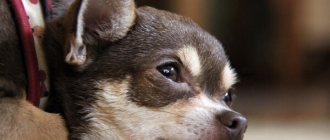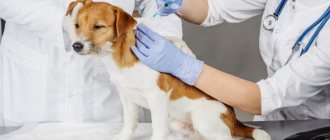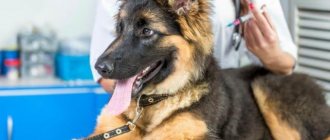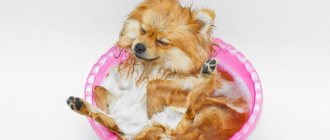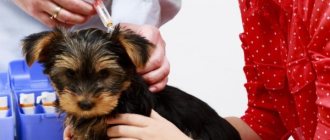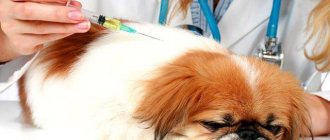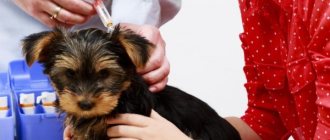Pomeranians have strong immunity, but the likelihood of viral and bacterial diseases is quite high. A dog can become infected without even leaving the house. Many of the diseases are deadly. The most reliable protection for Pomeranian puppies is vaccinations, which are administered strictly according to schedule and only after careful preparation of the pet. The dog owner should know what medications need to be used for vaccination, how to feed, walk and care for the puppy, and whether adverse reactions are possible.
Why do Pomeranians need to be vaccinated?
Vaccination is the introduction by injection or drops of weakened viruses or bacteria. Thanks to the immune response, the dog’s body “sees” them, produces antibodies and destroys the emerging threat. From one to two years, the Pomeranian Spitz remains protected from infections, after which revaccination is carried out.
If you do not get the necessary vaccinations, negative consequences are possible:
- The puppy can get sick, infect other dogs and die.
- If your Pomeranian has not been vaccinated and it bites someone, it will have to be quarantined for 10 days.
- The veterinary clinic may not accept you if there is no mark in the veterinary passport about mandatory vaccinations.
- Pomeranians will not be allowed to participate in exhibitions and competitions.
- Airplane travel within the country and abroad will be prohibited.
- Unvaccinated Pomeranians should not be used for breeding.
Home grooming of a Spitz:
You need to brush your Spitz daily, at least once a week.
First along the growth of the coat, then against the growth of the coat. Sprinkle baby powder behind the ears once a week or two if there is a tendency to tangles. Bathroom
: It is better to wash your Spitz at least once a month. Afterwards, dry it with a hairdryer, combing the fur against the grain from head to tip of tail.
A haircut
– divided into everyday and exhibition. It is better to do the show one at the groomer. Everyday - by ourselves. Trim your ears in a semicircle. Trim the excess hair around the claws, the base of the tail and the “pants” - diagonally.
Manicure (lapakure)
– at least once a week, maximum once a month. Cuts his hair with claw clippers.
Cleaning the peephole
– Small breed dogs often have watery eyes. This means that either the food is not suitable for the dog (food allergy), or she has narrow tear ducts. The easiest option is to wipe the area around the eyes with any lens liquid (buy at a pharmacy for people) or wipe the eyes with Oftal / Beaphar.
Ear cleaning
– from 1 time per week to 1 time per month. Wax in a dog's ear is a sign of an allergy.
Treatment for fur - used during the shedding period, for example, with mink oil from Befar.
Vitamins for wool
– during the molting period are required, the rest of the time – optional. The best are, but you can use brewer's yeast with sulfur (in pet pharmacies or pharmacies for people) and Biotin (in many countries it is considered a super product for hair, skin, nails, but in our country it is not popular - they are sold in any pharmacies as part of multivitamins or separately.
What vaccinations do Pomeranians need to have?
Dogs are vaccinated against many difficult-to-treat diseases, but mandatory vaccinations for the German miniature Spitz and Pomeranian include:
- From distemper, an infectious disease that is deadly for puppies and adult dogs.
- From hepatitis - an acute contagious disease accompanied by fever, damage to the liver, respiratory and nervous systems.
- From parvovirus enteritis - inflammation of the intestines, stomach and complete poisoning of the body.
- From leptospirosis - a disease that affects capillaries, muscles, liver, kidneys.
- From rabies, a dangerous fatal disease that causes inflammation of the brain.
- From parainfluenza, a highly contagious infection that affects the respiratory system.
While puppies are breastfed, they receive immunity from their mother's milk; later, mandatory vaccinations according to age help protect pets from serious fatal illnesses and maintain health.
Characteristics of the drug
Stronghold helps get rid of skin and internal parasites.
The active ingredient is selamectin. The drug kills nematode larvae, eggs of some helminths, and reduces the content of filariasis in the blood of a dog or cat. Adult nematodes are not affected by the drug. The substance acts on the muscle fibers and nerve cells of the parasite (it binds to the receptors of membrane pumps, blocks them), stopping the transmission of excitation through the tissues. This leads to dysfunction of organs and death of the worm. Does not pass through the blood-brain barrier without interacting with animal cells. The drug is safe for the body. It is used exclusively externally in accordance with the instructions (once or twice). The animal's skin should be dry.
After one and a half days, adult fleas, eggs and helminth larvae die. The effect lasts for a month, then the procedure is repeated if indicated.
Vaccination schedule by age for Pomeranians
It is not necessary to vaccinate before puppies are two months old. From birth, they are protected by the natural immunity acquired through breastfeeding. After weaning from his mother, he gradually weakens, the owner needs to think about vaccination in order to preserve the health and life of the Pomeranian Spitz.
An approximate vaccination schedule looks like this:
| No. | Dog age | Vaccine |
| 1. | 2 months | Complex vaccination against enteritis, distemper, parainfluenza, leptospirosis and infectious hepatitis. |
| 2. | 3 months | Repeated vaccination. |
| 3. | 6 months | Repeated vaccination against the same strains. |
| 4. | 8 months | Rabies vaccination (given at 6 months in case of unfavorable epidemiological situation) |
| 5. | 1 year | Revaccination against enteritis, infectious hepatitis, plague, parainfluenza and leptospirosis. |
Experienced breeders recommend keeping a diary in which they record all the data about the Pomeranian, including the vaccination schedule developed together with a veterinarian, and follow it.
About the scheme and some rules for vaccination of Spitz
Up to a certain age (9-11 weeks), puppies are protected by maternal, or colostral, immunity, which the puppy receives from its mother’s milk, and if vaccinations are given before the puppies reach this age, it will fight the vaccine, preventing the puppy’s own immunity from developing.
Therefore, the first vaccination is given when the mother’s immunity weakens and the puppy becomes susceptible to infections, this is precisely at 8-9 weeks of the puppy’s life .
2-3 weeks after the first vaccination, at 12 weeks of age , they give a second vaccination , or they also say revaccination of the puppy, vaccination against distemper.
The next stage is at 6-7 months , when a complete change of teeth occurs (against plague, hepatitis, enteritis, adenovirosis).
Then revaccination is carried out annually (the same vaccinations as at 6 months), and after that vaccinations must be done annually to maintain immunity, taking into account the schedule recommended by vaccine manufacturers, taking into account the recommendations of a veterinarian.
The first vaccination can be polyvalent: for example, against five major diseases (hepatitis, enteritis, adenovirosis, etc.).
There is a so-called early vaccination of puppies if there is a threat of infection with parvovirus or distemper: puppies are vaccinated with special vaccines at the age of 4-6 weeks. Such vaccines can overcome the barrier of maternal immunity. The most famous vaccine with these properties is Nobivac PUPPY.
Do not overuse early vaccination.
Scheme for using the Nobivak Pappy vaccine: 1st vaccination – 4-6 weeks, 2nd vaccination – 8-9 weeks, 3rd – 12 weeks.
I repeat once again that a responsible approach is necessary: be sure to visit a veterinarian, his competent intervention will benefit your puppy.
It is the specialist who will subsequently vaccinate the Spitz who must draw up a vaccination schedule specifically for your puppy, taking into account the climate and geographical location of your place of residence, as well as the epidemiological situation in your area.
Notes on each vaccination must be included in the Spitz's veterinary passport.
It is advisable to do vaccinations in a veterinary clinic by competent people.
Warning. Important!
It is very important to monitor the condition and well-being of the puppy precisely at that moment in time when maternal immunity wanes and vaccination has not yet been carried out, or immunity has not yet developed after vaccination. Protect your baby from infection: prevent contact with possible sources of the virus, hypothermia and other stressful situations. Take care of a high-quality, balanced diet.
After vaccination, for a week to ten days, do not bathe the puppy, do not tire him with games, avoid overheating and excessive cooling, and do not contact other dogs. Your attitude towards the puppy should be affectionate and careful, because vaccination is a small illness and a big burden for the Spitz.
After each vaccination, you cannot change your diet for at least two weeks.
You can start walking your puppy outside only after a 2-week quarantine at home after the second vaccination, that is, not earlier than the 15th week of the puppy’s life. If you take your puppy out before this time, your beloved pet runs the risk of getting a serious viral disease.
Revaccination
During vaccination, weakened or killed pathogens of intractable infectious diseases are introduced into the animals' bodies. As a result, antibodies are produced that can fight pathogens. Over time, immune memory becomes weaker.
After the first vaccination, the Pomeranian needs to be revaccinated or reimmunized. The procedure allows you to maintain immunity and antibodies at the level developed by previous vaccinations.
Pomeranians are revaccinated at the age of 12 months and then annually at the same time.
Required documents
Citizens of the Russian Federation
- Passport of a citizen of the Russian Federation (to confirm personal data and registration in Moscow)
- A certificate confirming vaccination (done no later than 6 months before revaccination), or a QR code of a person who has suffered a new coronavirus infection COVID-19 (6 months after the QR code is issued).
- SNILS
- Compulsory medical insurance policy (optional)
- Phone number linked to the State Services portal
For foreign citizens
- Citizen's passport (with translation)
- Registration in Moscow
- A certificate confirming vaccination (done no later than 6 months before revaccination), or a QR code of a person who has suffered a new coronavirus infection COVID-19 (6 months after the QR code is issued).
- SNILS
- Phone number linked to the State Services portal or mos.ru
How to prepare a puppy for vaccination?
Your puppy should be prepared for vaccination in advance. Anti-helminth medications are given two weeks in advance. In case of high infestation, deworming is repeated 10 days after the first treatment. If you do not rid your puppy of parasites before vaccination, allergic reactions, lack of the required amount of antibodies, or severe illness instead of the expected immunity are possible.
Before the vaccine is administered, the orange is treated against ticks, fleas and lice.
Three to four days before the procedure, you need to measure the puppy’s body temperature, do not overload it physically, do not change your usual lifestyle, and protect it from stress and travel. The pet is not fed on the day of vaccination.
When to start preparing for vaccination
Ideally, preparation for vaccination takes about two weeks. This period especially needs to be maintained before serious vaccinations, for example, DPT. If your immune system is weakened, chronic diseases often occur, or there is a high risk of an allergic reaction, it is advisable to visit an immunologist.
The child will need psychological preparation before vaccination. It is better to explain the purpose of the visit to the treatment room in advance; you can watch a themed cartoon or play a game with a similar plot.
The procedure for vaccination at home
Pomeranians can be vaccinated at home. This can be done independently or by inviting a veterinarian. On the advice of a doctor, buy the vaccine at a veterinary pharmacy and store it in the refrigerator. She can stay outside it for no more than two hours. Immediately before the procedure, the pet is examined and its body temperature is measured.
The injection site is treated with alcohol, the ampoule is opened, the drug is drawn into a syringe and an injection is given subcutaneously or intramuscularly (depending on the instructions in the instructions).
Only a veterinarian can make a note in the passport.
General rules
The breeder must keep a veterinary passport for each puppy with notes on all vaccinations given. Upon purchase, this passport is issued to the new owner of the animal along with other documents. Ideally, the breeder should also help draw up a further vaccination and prevention plan.
Please note that only completely healthy dogs can be vaccinated.
Before the procedure, the puppy must be dewormed: parasites reduce the level of immunity. The first time the puppy is given deworming medication is at the age of 3-4 weeks (it is advisable that the breeder do this). The second treatment should be carried out no earlier than 14 days after the first and 10–15 days before the vaccination itself.
Anti-worm medications are given strictly according to instructions. Many of them cause thirst, so make sure your pet's water bowl is not empty at this time. Give your Spitz activated charcoal to avoid toxicosis: before dying, parasites release large amounts of harmful substances.
Also, if necessary, you need to get rid of fleas and ticks in advance.
2-3 days before vaccination you need to check the dog’s body temperature. To do this, a thermometer lubricated with Vaseline is inserted into the anus a third of the way and held for about 15 minutes. This procedure cannot be carried out immediately after eating or sleeping; it is better to wait up to a quarter of an hour. Normal temperature for dogs is between 37.5–39.3 °C.
Take your temperature several times throughout the day, recording the results. If the puppy is healthy, it should remain almost unchanged.
Vaccination should be postponed in the following cases:
- elevated temperature;
- indigestion, weight loss;
- rash;
- discharge from the eyes;
- inappropriate behavior or stress due to the move;
- deviations in physical development.
In all these cases, you must first cure the dog.
After taking the hyperimmune serum, at least two weeks should pass. If the dog has been treated with immunosuppressants, the appropriate time for vaccination should be determined by a veterinarian.
Consequences and adverse reactions after vaccinations in oranges
Even if all vaccination rules are followed, complications are possible after vaccination - increased body temperature, swelling and pain at the injection sites. Most often, they disappear within three days without consequences.
If the symptoms are more serious, you should immediately seek help from a veterinarian:
- uncontrollable vomiting and diarrhea;
- loss of coordination and disorientation in space;
- the appearance first of a tumor, and then of suppuration at the injection site;
- increase in body temperature by more than 1 ⁰С;
- complete refusal of food, lethargy and loss of activity.
The presence of one or more symptoms may indicate an allergic reaction to the drug, a dosage violation, or a weakened Pomeranian.
How do spitz grow?
Some Spitz grow up to 4 months, others - until puberty, up to about 9 months. Pomeranians grow in height up to about 4 months, then they begin to grow in width. The dog will actively grow up to 4 months. At 4 months she will be almost as tall as an adult dog. And then it will begin to grow in breadth: the bones will become stronger, the muzzle will expand. From 5 months, the dog will begin to shed - the puppy coat will change to an adult one. During this period, the Pomeranian is jokingly called “pimply”. By 9 months, she will look like an adult Spitz, only the hair will not be as long and thick. By 1 year the dog will shed again. Then he will dress in an even more luxurious fur coat. Spitz shed once a year. Boys gain thickness and length of fur after their one-year molt. Girls' fur becomes noticeably thicker after childbirth, and the girls themselves become much prettier after pregnancy.
In what cases is it better to postpone vaccination?
There are situations when the procedure should not be carried out as planned. Reasons why it should be postponed include:
- pregnancy or lactation period;
- skin rashes;
- bitch in heat;
- poor general condition;
- replacement of milk teeth with permanent ones;
- less than eight weeks old;
- increased body temperature;
- the need to take strong medications;
- allergy to the drug.
After consultation with a veterinarian, a new time for the procedure is set and full preparation for it is carried out.
Puppy branding
A few days later the Spitz puppies were branded. This procedure is even more unpleasant than vaccination. The most patient are Mail and Marcel. Molly and Marquis showed their displeasure immodestly, but the branding passed.
The puppies are branded by a specialist from the kennel club in which the litter is registered. The stamp number must correspond to the metric data. Branding is a very responsible process!
How to brand puppies
First you need to shave the fur on the belly where the brand will be. The specialist needs to prepare a workplace and tools. It took about 10 minutes to get ready to brand the puppies.
Before starting branding, we place the puppy in such a way that the specialist can clearly see the place for the brand. One cannot do this alone, so Masha carefully held the puppy’s hind legs so that he would not escape during the procedure.
A purebred puppy must be branded - these are the rules. Both the puppy and the owner will have to be patient. This procedure is unpleasant for both the puppy and the owner. During branding, the puppy may whine, bite, or try to free itself. You need to hold the puppy firmly, but not tightly. Masha held it, and I filmed. We did it!
_ _
This week has been hard for everyone! Masha and I have chronically not gotten enough sleep since the puppies were born. Olivia was also tired, and the molting emphasized her internal state. Vaccination, branding, and a day later we were expected to part with some puppies.
